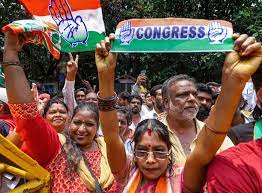In the 2024 Karnataka Assembly polls, an interesting observation emerged as the BJP maintained its overall vote share of 36 percent in the state. Despite this, the party experienced a significant decline, losing over 40 percent of its existing 116 seats in the Assembly.

The BJP’s reduced seat count of 65 despite maintaining a 36 percent vote share in the 2024 Karnataka Assembly elections can be attributed to two main factors. Firstly, unlike in 2018 when the party secured 104 seats with the same vote percentage, the current high vote share primarily originates from two specific regions, namely Old Mysore and Bengaluru. Secondly, the BJP has managed to garner votes from the JDS’s support base in south Karnataka; however, this strategic shift has not translated into winning seats in that region.
An analysis of the latest polls, which witnessed a remarkable 73 percent voter turnout, highlights the distribution of seats won by the Congress, BJP, and JDS across different regions. The Congress party experienced a rise in its vote share, surging from 38 percent (80 seats) in 2018 to 43 percent, enabling them to secure victory in 135 seats. On the other hand, the JDS observed a decline in its vote share from 18 percent (37 seats) to 13 percent, resulting in the acquisition of only 19 seats.

The disparity of seven percent in the vote share between the Congress and the BJP has translated into a significant gap of 70 seats between the two parties.
The Congress achieved a significant victory by securing wins in the Mumbai Karnataka region and central Karnataka, which were previously considered strongholds of the BJP. Additionally, the Congress garnered emphatic victories in Hyderabad Karnataka, where they have traditionally performed well, and in the Old Mysore region, which was typically dominated by the JDS.
In the Mumbai Karnataka region, which is known for its significant Lingayat population constituting the largest community in the state (17 percent), the Congress emerged triumphant in 33 out of the 50 seats. This marks a reversal of the 2018 election results when the Congress won only 16 seats compared to the BJP’s 31 seats.
In the Hyderabad Karnataka region, the Congress secured victories in 26 out of 40 seats, showcasing a gain of five seats compared to the 21 it won in the region during the 2018 elections. In contrast, the BJP’s seat count declined by three seats, as they managed to win only 10 seats this time.
The central Karnataka region witnessed the Congress winning 19 out of 23 seats, exhibiting a substantial increase of seven seats from the 2018 elections. Conversely, the BJP’s seat tally dropped to four seats from the 10 seats they had won previously in 2018.

In the Old Mysore region, which consists of 64 seats, the Congress achieved an exceptional performance by securing victory in 43 out of the 64 seats. This marked a significant increase of 23 seats compared to the 2018 elections. Meanwhile, the BJP witnessed a loss of 11 seats in the region, and the JDS saw a decrease of 12 seats from their respective tallies in 2018.
Bengaluru proved to be the BJP’s stronghold, as they won 15 out of 28 seats, showcasing an improvement from their initial tally of 11 seats in the 2018 elections. In contrast, the Congress secured victory in 15 seats in 2018 but did not witness a change in their seat count this time. Additionally, the BJP experienced a slight setback in its strongholds in the coastal Karnataka region, winning only 13 out of 19 seats as compared to their previous victory of 16 seats in 2018. The Congress, on the other hand, gained three seats in the region, winning a total of six seats.
Former Karnataka CM Siddaramaiah attributed the Congress’ victory to the decision made by the people of Karnataka for a decisive outcome. According to him, the people of the state desired to give a majority to a single party, which reflected in the election results.













